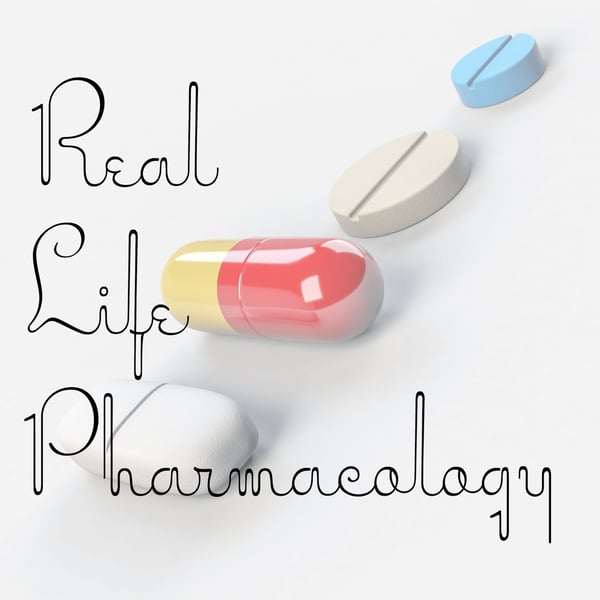Lurasidone Pharmacology
Real Life Pharmacology - Pharmacology Education for Health Care Professionals
Eric Christianson, PharmD; Pharmacology Expert and Clinical Pharmacist
5 • 716 Ratings
🗓️ 18 August 2022
⏱️ 18 minutes
🧾️ Download transcript
Summary
CYP3A4 is an important enzyme in the breakdown of lurasidone. I discuss this further on this episode.
Lurasidone is best taken with food as this enhances absorption and helps improve drug concentrations.
Lurasidone tends to have a lower risk for metabolic syndrome compared to other antipsychotics which is a nice advantage.
Transcript
Click on a timestamp to play from that location
| 0:00.0 | Hey all, welcome back to the Real Life Pharmacology podcast. I am your host, pharmacist, Eric Christensen. |
| 0:05.2 | Thank you so much for listening today. Go check out Real Life Pharmacology.com. Get your free 31-page |
| 0:12.7 | PDF on the top 200 drugs. Great study guide, great refresher, great preparation if you're taking |
| 0:19.8 | pharmacology classes or board exams for any |
| 0:24.0 | healthcare professionals. So get that absolutely for free. Simply an email will get you that |
| 0:29.2 | for subscribing to the podcast. We'll let you know when we've got new content, new episodes |
| 0:34.5 | available. And obviously we'll get that top 200 study guide out to you as well. |
| 0:41.4 | So again, go check that out. Real Life Pharmacology.com. The drug of the day today is Larazadone. |
| 0:49.3 | Brand name of this medication is Latuda. This medication is an antipsychotic. |
| 0:56.7 | And more specifically, it's a second generation antipsychotic. |
| 1:02.3 | Mechanistically, how this drug primarily works, |
| 1:06.1 | and most antipsychotics work is they antagonize the D2 receptors or dopamine 2 receptors. |
| 1:15.9 | And if you remember the yin and the yang between, you know, induced movement disorders, |
| 1:23.0 | so things like Parkinson's disease, that's generally caused by a deficiency of dopamine. |
| 1:29.5 | So we supplement with dopamine to treat that. |
| 1:32.8 | So on the flip side, you can imagine antipsychotics, they block dopamine. |
| 1:37.2 | They can cause Parkinson's-like symptoms, which often we refer to as extraparaminal symptoms, |
| 1:43.3 | which I'll get to a little more in depth |
| 1:45.2 | in the adverse effect profile. But that's one of the major ways that I remember mechanistically |
| 1:51.4 | how this works. If you have too much dopamine action in the brain, it can lead to psychotic symptoms. |
| 2:00.7 | If you have too little dopamine action in certain brain, it can lead to psychotic symptoms. If you have too little dopamine action in certain |
| 2:04.6 | parts of the brain, it can lead to movement disorders and things of that nature. In addition to |
... |
Please login to see the full transcript.
Disclaimer: The podcast and artwork embedded on this page are from Eric Christianson, PharmD; Pharmacology Expert and Clinical Pharmacist, and are the property of its owner and not affiliated with or endorsed by Tapesearch.
Generated transcripts are the property of Eric Christianson, PharmD; Pharmacology Expert and Clinical Pharmacist and are distributed freely under the Fair Use doctrine. Transcripts generated by Tapesearch are not guaranteed to be accurate.
Copyright © Tapesearch 2025.

